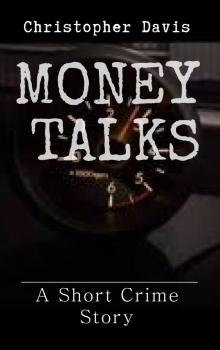- Home
- Christopher Davis
The Conduct of Saints Page 2
The Conduct of Saints Read online
Page 2
INSTEAD OF going in through the restaurant’s principal entrance, Brendan squeezed between two of the planters set out to create an open dining area on the piazza. He offered his cheek to be kissed by the woman seated at the table there, threw down his briefcase, as if it offended him, sat, and spread his legs, a hand on each knee, face red from exertion.
“How are you managing with your murderer?” the woman asked.
“Serenelli or Koch? I have two, one in a cell in the Regina Coeli prison, the other doing a bit of gardening in a Franciscan monastery. Serenelli may or may not be mad.”
He told her about the policeman who had called him a psychopath.
“He’s quite right. You’ll kill someone with that bicycle, or kill yourself.”
A waiter offered him a menu mimeographed in faded ink. “Nothing at all. Perhaps a little wine. Hang on—mussels!” The priest looked into the man’s face. “Are they fresh? All right, a few mussels and a half of the Agrigento. Wait!” He massaged his gray curls, snatched the menu from the waiter, held onto the man’s arm to keep him, finally ordered a meat dish to follow the mussels. “Bring it all, Tito, the other half of the wine with the meat.”
“That’s not his name,” she said when the man had gone.
“I thought we called him Tito”—his breathing slowing.
“A dog is called Tito.”
They spoke in English. “Listen, Alda,” he said. “It’s Koch we need to discuss. Serenelli is of interest to me only as an exercise in abnormal behavior. That’s off the record. In view of what we already know, our interviews are supposed to run on rails, but I can’t find a way into the man. Even this early in the game, with anyone else I would have discovered something to use to open him up. He irritates me, I don’t know why. Of course, friendship is not a requirement.”
“I hope you don’t find him out to be false after all this.”
“Evasive. Not that it matters. He’ll be allowed his miracle, which is essential to the process, since the attested subsequent miracles, the restored cripples, and what I think of as copycat visions, are relatively small beer. Pius is not great on second thoughts. He pays no attention to people coming forward with objections concerning things he feels are sufficiently proved. My job is to make sure Serenelli will stand fast and not be an embarrassment.”
“Mustn’t a proof be final?”
“Not for priests and lawyers. A Bishop’s Court wants a convincing preponderance of evidence and a few articulate witnesses. The advocatus diaboli they employed was a sentimentalist. His notes are virtually unreadable. That needs clearing up. We don’t want the procedure tainted by some perfectly sincere journalist armed with what he believes is evidence to back a claim saying Serenelli has played a con game or been a bad boy, lying with harlots and so on. We need to be prepared to deal with such things if they occur.”
“I don’t know what that is. Con game.”
“A fellow gains your trust, your confidence, by presenting you with something of apparent value, provided you give him some other thing as security, money preferred. It seems like a good deal, so you agree, whereupon he disappears, leaving you with useless collateral, a forged title or something.”
“Bidonista.”
“Exactly.”
Alda Calfani sat in her chair erect as a soldier, flat chest forward, chin raised, chain-smoking. She was tall and thin, dark hair shot with gray and tied up in a widow’s bun, pins loose, strands flying. She had a Roman pallor, wore a long, unbelted smock of plain gray cotton with a black ribbon sewn over the heart, a dress for which she was known in the city, which she wore everywhere, even to formal occasions, and which she called her Resistance uniform, though she had sometimes been taken for a nun wearing it. She had sold her jewelry, even her wedding ring. A purse of worn leather, its chain attached to a length of twine, hung around her long neck and fell to her waist. She had sewn on the mourning ribbon the day the Nazis occupied Rome and would not remove it even now, with the city’s liberation a year old. “We’ll wait and see if the Allied occupiers are going to behave themselves, politically speaking. I’m doubtful.” Her home had been a safe house for anti-Fascists and anti-Nazis on the run—partisans, Jews, escaped American and British prisoners.
Brendan asked, “Where do you get your Player cigarettes?”
“From an English colonel.” She offered her case.
“I’ll take two, if it’s all the same.”
“It’s all the same. My American lieutenant Tommy Costa brings me Lucky Strikes, but I prefer the tobacco in the English ones, probably because I began with the little Woodbines when I was thirteen. I see no reason why Alessandro Serenelli shouldn’t irritate you. I’m sure you irritate him. Are you saying he plays the con game?”
“I find men like him all the time—prisoners or, as in Serenelli’s case, ex-prisoners. They have amnesia concerning their crimes. I’m fascinated by the business of truth among liars, particularly in cases of religious conversion. The dream becomes a fact because it’s necessary, not to gain anything practical, though in Serenelli’s case there was a practical aspect, since it got him out of prison. No, it’s for self-respect, without which life is intolerable, for them as for us. This man Serenelli. He has blocked all memory of the murder he committed, or he claims to have. I want him to remember.”
“Why, for God’s sake? After all these years? Leave him alone.”
“Then where’s the basis in reality, in bloody fact, for his renowned penitence? The old man is sorry for a brutality he can’t remember having committed. I want to hear it from him. For me, it’s the sine qua non.”
“So interesting,” she said. “I’ll have to suppose you understand these things.” And, not lowering her voice: “Have a look at the table by the door into the dining room. Go on. He likes being noticed. That’s one of my people.”
The person she indicated, a plump young man with a pale mustache, wore the uniform of a high-ranking RAF officer. He sat with another British officer, an American major with a Fifth Army patch on his shoulder, and a young woman in a uniform he did not recognize. The English officer, who had tucked a napkin into his collar, smiled, rose slightly in his chair, and bowed.
“Is he influential?”
“Only if you need English cigarettes and Scotch whiskey.”
“But you do know the Allied Commissioner.”
“He’s been my guest. He is not to be influenced, Brendan.”
He ate the mussels, and afterward a dish of veal with the second carafe of wine, followed by salad, cheese, and fruit, while she watched and smoked, the wine he had poured for her untouched.
“The veal was done in margarine,” he said when he had finished. “Listen, Alda. I’m in earnest. I need someone who will put in a word for Koch, my prisoner in the Coeli.”
“Count me out. Is that the idiom? If you want to help a bastard like Koch, you need a Fascist sympathizer who has gained anti-Fascist credentials. Try Hilda. She likes rough men, provided their crimes are committed out of her sight. She’s a marchesa, which still carries weight, and she knows people. The war hasn’t killed social ambition. Or talk to one of the Nazis who float around the city disguised as human beings, looking for some means of escape. Weisbard is out there somewhere. Offer an exchange. He points you to a powerful Fascist well in with the Allied Commission and the Tribunal, and you do something to help him. They’re desperate for money for bribes and sea passage to South America. But I must tell you that no one I know whom I would think of calling a friend will speak up for Koch. He is a famous piece of shit.”
“I agree, but I’m his priest, or one of them.”
“It’s no use, Brendan.”
“He’s asked to be baptized.”
“Repentance? Who’s doing that dirty work?”
“He’s got Isidro Consalves, the fat bishop who was attaché in Madrid. Koch may have something on him.” He said after a moment, “Don’t say no right away, but you might consider talking to His Holiness, if I can arran
ge it. You know how to touch his emotions. He mentioned your name recently at a morning assembly. A note he saw in Le Figaro reminded him, and he asked about your health and the Prince’s. He would listen to you before me.”
“Would he? Well, I won’t do it, and since he could have no influence at this point, he wouldn’t dare interfere. I won’t move a finger to help Koch. We are at this moment sitting twenty-five yards from the place where he sent some of his most recalcitrant victims to be finished off, if he didn’t want to be connected with their death. Talk to His Holiness yourself. You’re the lawyer. I don’t agree that he would listen to me before you at this stage. I’m much too left-wing. Discover a legal basis and ask him to offer that to the High Court, or have one of his Resistance-sympathizing cardinals do it.”
“There is no such basis except in military law, which won’t work because Koch was not a soldier. Pius doesn’t want him killed, but he’s afraid to put a foot wrong.”
“So he should be.”
Brendan said, “Macfarlane and Fiske have power behind the scenes in regard to the Italian High Court. It’s their creature, in effect. If you set it up, His Holiness might be willing to talk informally to one of the Commissioners, and he could have a word with the court.”
“I’ve told you they’re not to be swayed, Brendan. Colonel Fiske would put a pistol to Koch’s head himself. Why do you keep assuming I care?”
“Right. You’re right, of course.”
Children had appeared and were patrolling the fence formed by the planters. If a waiter observed them, he would take the napkin from his arm and make the same shooing motion he used to frighten pigeons. Neither the pigeons nor the children paid any attention, and the waiter was not in earnest. There were three of them—two girls of about ten and a boy several years younger. They looked to be a family, and they shuffled along deliberately and wordlessly. Where there was room between the thickets of sweet-smelling mock orange blooms, one or another would shove in a filthy hand.
Brendan reached into his briefcase and produced his blue packet.
“For God’s sake, don’t give them cigarettes!” She opened the leather purse slung around her neck, dropped a coin into the nearest hand, said, “God bless you, child,” and waved away the others. “All they need is a pulmonary disease to finish them off. I thought you didn’t have any smokes.”
“This dung doesn’t qualify.”
He made a pass at the bill when it arrived, but she got to it before him, opened the worn purse again, took out a silver pencil, and signed the square of flimsy paper. “Why do we go along with your lies and pretenses?”
Brendan said, “A crowd of kids like the ones here hangs around the monastery where Serenelli is a guest of the Franciscans and where he does his gardening. There’s a break in the wall made by grenades the Nazis were tossing in the days before their retreat was organized. Or maybe it was an American bomb. The kids gather there and spend the day observing him. They know who he is, because he’s already a celebrity in the neighborhood. It doesn’t do much for the monastic ideal of seclusion. He gives them his food, passes it through the hole in the wall.”
“He sounds lovely,” Alda said. “If I have to choose between murderers, I’ll take your Serenelli.”
“He knows their names, boys and girls both. One named Rachele is beautiful. She looks about twelve or thirteen, more or less the age Maria Goretti was when Serenelli murdered her.”
“You’re worried he’ll rape her?”
“I’ll use the thought, let it hang in the air between us, to help pry him open. There’s an elementary school across the street—lots of girls—and that must be a temptation too. Also, while I was interviewing him, he said he saw an airplane in the clouds that wasn’t there. There were no clouds either. Maybe he’s afraid of bombers. I told him the war’s over and Hitler is dead. No, the problem is to get him to open up. He says that all he knows about the crime he committed is based on what he heard in court. He remembers nothing except finding himself afterward covered in blood, the carabinieri waiting.” He said, “Incidentally, what I’m telling you is between us. I’m not supposed to discuss these things.”
“So you said. From what I can make of it, I expect you’re wrong about him, that he’s just what you see. One would think you have no faith. My advice is to let well enough alone in both cases, Brendan. Koch is a mass murderer, and your Alessandro’s soul is saved, as I understand it, whether he’s mad or not.” She rose and said, “Stay and have a sweet, darling. It’s signed for. I’m sorry I can’t be of use. Anyway, you exaggerate my prestige. Was there anything else you wanted to bring to my attention?”
“That’s the lot”—rising too, napkin in his hand. “Thanks for lunch. How is Renato? His Holiness will want to know.”
“Back from Tuscany. He was rusticating and reading or, as he likes to say, rereading Virgil.”
“And your American, Lieutenant Costa?”
“Tommy’s busy with his boss, the brigadier. They’re collecting stolen and marked-down art as fast as they can.”
“Would he talk to his boss? What’s his name?”
“Mike Courtland. Why are you being so byzantine? Ask Tommy yourself. I’ve learned not to waste favors.”
“Renato?”
“My husband is a saint,” Alda said, “but if Koch were on fire, he wouldn’t piss on him.”
After a moment, while they stood, she with her brows raised on her bony forehead, waiting, smiling, Brendan said, “Listen, I don’t mind seeing Koch in prison for the rest of his life, but I don’t want him killed.”
“He might prefer being killed.”
“It’s not a matter of what he prefers, Alda.”
She said, “He’s being tried for collaboration by Italians, not by the International Tribunal. It’s an Italian affair. You won’t find sympathy for him among most people.”
She offered her cheek, and he kissed it.
She said, “I’ll tell you what. Tommy Costa will bring Mike for drinks and something to eat. Six or eight people altogether. I can’t vouch for the others’ influence or courage, but come and have a word with the general, and you can talk to Renato at the same time. It won’t do any good in Renato’s case, but you ought to try in order to be able to tell yourself you’ve done so. Keep Friday and Saturday open. Telephone me Friday morning.”
◂ 2 ▸
BRENDAN HAD learned to recognize them on the streets because he knew where to look: collaborators of mid-level rank, upper level military Fascists on the run, the actual Nazis among them, those cut off in the retreat, all of officer rank, dressed in cast-off civilian clothing, disguised, as the princess had said, as human beings. They looked for passage out of the country, hoping to get onto the so-called Rat Line, just then beginning to function with efficiency, and be passed on to Argentina and other hospitable places. Those with money had obtained documents and succeeded; those without had been on the street for the best part of a year. The police of the Allied Military Government picked them up when they were identified, but there was no organized search. Brendan knew a few from formal Vatican councils before the occupation and holiday parties at the Excelsior and Eden during it.
One man sat every day in the shadow of the massive post at the foot of the steps of the Piazza di Spagna next to the English tea shop, apparently feeling safe in the crowd of beggars and prostitutes who had moved in from Trastevere since the Allied occupation, and the young American and British soldiers who congregated every morning and evening, alone or with their girls and cameras and guidebooks. The man would pretend to be reading a newspaper, holding it before his face if he thought he was being observed, lowering it to glance around. If you wanted to present a portrait of guilt and anxiety, you could not do better. He had been a very young officer in the diplomatic service with a small staff of his own and a title, Brendan remembered, stationed at the German embassy, and attached as liaison to the front offices of Gestapo Headquarters in Via Tasso. Probably not one of the killers, bu
t certainly aware of the death warrants and executions. Brendan remembered that they had been introduced at an embassy function, the young German polished and elegantly turned out. Now the man wore a filthy suit with stripes, an American polo shirt, and sandals. He had blacked his hair. Passing, wheeling his bicycle, Brendan caught his eye and gave him a faint smile, which the other returned with a look of surging hope. The priest slightly shook his head, and the man at once looked away. He was like a bad actor in a film. Was his name Borger? Borgman? It was a mistake to have looked, and he was sorry he had—a kind of vanity, as if to show he was a man who knew secrets. He did nothing concerning such encounters. He was no policeman.
◂ 3 ▸
AT THE Regina Coeli prison, curious, he told Pietro Koch about seeing the man.
“Berghof! I know him. An Embassy flunky and an anti-Hitler pacifist. His department was working towards a separate peace. No use to us at all. He never gave us names. But that’s clever—to hide in the open like that. I could not have done something similar even if I’d had the chance. My face is too well known. Is it the same one I wonder? The Berghof I know is a kid like me. But it must be the same. He had been promoted above his station. They were promoting them in droves towards the end, creating middle and upper level dummies to take the heat off the real bosses. I don’t wonder he was hopeful, being recognized by a Vatican official.”
Because of Brendan’s position, he and Koch were allowed the use of a room in the administrative wing of the prison fronting Via della Lungara and the Tiber. The room was employed as a temporary work station for officers filing reports and for interviews such as this, if a prisoner or visitor was of importance. There were a battered desk with a dictionary and an old American typewriter on it, a metal bookcase, and a couple of hard yellow folding chairs. Normally, the prelate arrived first and waited for Koch to be brought to him, but today Brendan found him already there. As always, the ex-policeman was military in his manner, rigidly polite, rising, giving a little bob of a bow, waiting for the prelate to offer his hand, not appearing to mind if he did not, waiting again to seat himself until the other had taken a chair; but he was also a little ironic in these gestures, a little humorous.

 Money Talks
Money Talks Vicky's Secret
Vicky's Secret Unholy
Unholy Ain't No Law in California
Ain't No Law in California